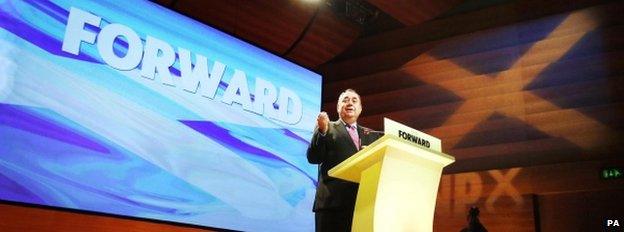Alex Salmond tells conference 'the nonsense ends' in 2014
- Published

SNP leader Alex Salmond opened his party's conference in Perth with a pledge to end the nonsense in 2014
SNP leader Alex Salmond has opened his party's conference with the declaration that in "2014 the nonsense ends".
The first minister's comments came days after Scottish ministers struck a deal with the UK government to hold an independence referendum.
Mr Salmond also said he trusted the conference to discuss issues in a "comradely manner".
The conference is due to debate a contentious plan to reverse its decades-long opposition to Nato.
Speaking in Perth, Mr Salmond said only independence could protect the social fabric of Scotland, which he said he believed was under attack from Westminster parties.
On Friday, conference delegates are to be asked to overturn the SNP's traditional anti-Nato stance, with the party's Westminster leader Angus Robertson arguing the organisation plays a key role in defence and security.
If successful, the move would still see the SNP maintain its opposition to hosting nuclear weapons.
The change is being opposed by a number of SNP MSPs, councillors and rank and file members, who say an independent Scotland should not be a member of the international defence organisation because of its status as a "nuclear weapons-based alliance".
Mr Salmond told the conference: "I trust this conference to operate in the best interests of achieving independence for Scotland.
"I trust this conference to debate the big issues in a comradely manner. I think it is fantastic, I think it is great that we are the only political party in these islands with the confidence to take substantive issues to our annual conference."
Mr Salmond also read from a poem by George Robertson, brother of Hearts legend John Robertson, which was recited at a recent SNP dinner event.
The final line of the poem reads: "Eat well my trusty, honest friends, in 2014, the nonsense ends."
Mr Salmond told the conference: "Delegates, conference, in 2014, the nonsense ends."
Alex Salmond: "We are closer to our objective [Scottish independence] than we have ever been before."
Speaking to the BBC earlier, Mr Salmond said the SNP was the closest it had ever been to achieving its objective of an independent Scotland.
Mr Salmond told BBC Radio Scotland's Good Morning Scotland programme: "The Edinburgh Agreement makes it clear that both governments have decided to agree a process - and that means to respect the result.
"That is a huge gain for the independence cause. It means we are closer to our objective then we have ever been before and, of course, I believe that we will win the vote on independence in two years' time.
"But the results and the verdict is a matter, of course, for the Scottish people."
He added that he had not changed his mind that the vote was a once-in-a-generation opportunity.
Ballot box
On Monday, Mr Salmond and Mr Cameron signed a deal to deliver an independence referendum in 2014.
It consists of a single Yes/No question on Scotland leaving the UK and will allow 16 and 17-year-olds to take part in the ballot.
The SNP secured a mandate to hold the referendum after its landslide Scottish election win last year.
Speaking ahead of the four-day gathering, Deputy First Minister Nicola Sturgeon said independence was "there to be won".
After signing the referendum agreement on Monday, Mr Cameron said he hoped Scotland would vote to "keep this United Kingdom together".
But Ms Sturgeon said she believed Scots would opt instead for independence when given the opportunity at the ballot box.
She said: "This week's agreement between the Scottish and UK governments ensures that we will have a referendum made in Scotland, with the outcome respected by all sides - the task now is to go out and win the argument among the people.
"And if we win the argument, we will win the referendum."